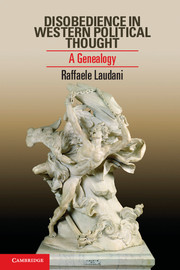2 - The Modernity of Disobedience
Published online by Cambridge University Press: 05 June 2014
Summary
Disobedient Humanism
The emergence of the state as a new institution able to positively respond to the crisis of respublica christiana brought about a radical transformation in the way of conceiving and discussing disobedience. “I should like merely to understand,” asks Etienne de La Boétie in his Discourse of Voluntary Servitude (1548), “how it happens that so many men, so many villages, so many cities, so many nations, sometimes suffer under a single tyrant who has no other power than the power they give him; who is able to harm them only to the extent to which they have the willingness to bear with him; who could do them absolutely no injury unless they preferred to put up with him rather than contradict him.” This seemly banal question instead implied a conception of politics that was unthinkable up until that time. On one hand, it revealed an unsettling attitude in each individual to voluntarily serve the established power – even desiring it in certain cases. However, on the other hand, in a context in which the king was still considered by most as quidem corporalis Deus, it also exposed sovereign power to a new structural fragility since its authority was totally dependent on the consent that – sometimes – its subjects decided to give it. Obedience, until that time thought of as a natural correlation to the extraordinary qualities of the Monarch or of his control function in an order of Being willed by God, now became a “mystery,” the artificial result of a “fascination” and “habit,” of man's inclination to “take the form that education gives him.” Obedience, therefore, had to be continually fostered and nourished in the soul of each individual.
- Type
- Chapter
- Information
- Disobedience in Western Political ThoughtA Genealogy, pp. 33 - 54Publisher: Cambridge University PressPrint publication year: 2013

